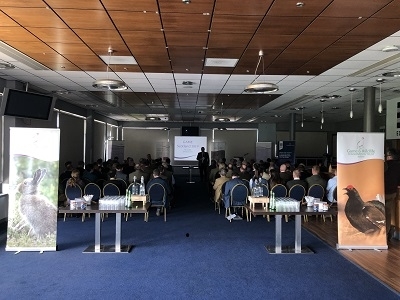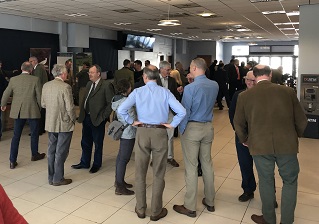Our inaugural GAME Scotland conference, held at Perth Racecourse on 29 March, attracted 87 keen attendees. Scottish chairman David Noble welcomed our guests and senior advisor Hugo Straker introduced and chaired the day’s presentations:

- Dr Adam Smith’s opening talk highlighted the importance of GWCT research in the uplands and lowlands to game, wildlife and practitioners.
- Our keynote speaker, Edward Mountain MSP, Convener of the Rural Economy and Connectivity Committee of the Scottish Parliament, gave the conference a good insight into parliamentary procedures and went on to relate his passion for the rural way of life, both as a farmer and countryman, stressing how vital best practice is to future-proof our industry.
- A ‘double act’ by Alan Johnson of Kings and Dr Dave Parish of GWCT Scotland highlighted the valuable partnership work being carried out for grey partridges, not just in Scotland, but throughout the UK and Europe. Particular reference was made to innovative cropping approaches to conservation.
- Tim Baynes, Director of Scottish Land & Estate’s Moorland Group, gave an update on the Grouse Moor Management Review, looking at the environmental and socio-economic impacts of driven grouse shooting in Scotland. The eagerly awaited results from this independent review will be released later than expected due to unforeseen circumstances.
- Merlin Becker, trainee advisor GWCT Scotland, gave a passionate presentation on adaptive management licences and the Strathbraan case study in Perthshire. This first licence of its kind in Scotland, England and Wales was granted to cull a protected bird to conserve another protected bird. Adaptive management licences are at the forefront of helping to enhance populations of wading birds, usually associated with land managed for driven grouse shooting.
- Dr Jonathan Reynolds, GWCT Head of Predation Control Studies, spoke on the significant changes to trapping legislation in the UK and took an in-depth look at why Fenn-type spring traps are being phased out and how the industry needs to recognise and embrace the opportunities that are now available. The last few years have been spent guiding the regulation of spring traps away from a cliff edge, towards a future that is workable as well as defensible.
- Matthew Balfour MRCVS of St David’s Gamebird Services gave a talk on antibiotic use in gamebirds and how the industry must eliminate the dependency, aiming to reach the impressive target of 100% reduction in antibiotic use in laying hens.
- Tom Adams, British Game Alliance and John Queen, Headkeeper, Linhope Estate gave a valuable talk covering the BGA’s excellent work, in tandem with the Home Office, towards securing trade deals with India, Japan and China for British game. All shoots, big or small, are encouraged to sign up to the BGA’s accreditation scheme.
- Last, but certainly not least, Ross Macleod, Head of Policy GWCT Scotland, and Hans McKenzie Wilson, head keeper of Invercauld’s Micras and Gairnshiel beat, gave presentations on the importance of mountain hare monitoring in Scotland to refute assertions that sporting estates cause local declines. GWCT Scotland is taking the lead on this pioneering work, having trained up 68 keepers and land managers from 47 estates across Scotland on the new counting methodology and revealing that mountain hare densities are the highest in Europe on upland environments managed for grouse.
Our sincere thanks to event sponsors: Bidwells, Game & Country Ltd and Thorntons Law LLP
